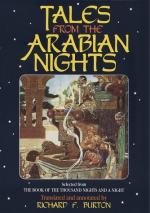End of Vol. 7
Arabian Nights,
Volume 7
Footnotes
[FN#1] Mayyafarikin, whose adjective for shortness is “Fariki”: the place is often mentioned in The Nights as the then capital of Diyar Bakr, thirty parasangs from Nasibin, the classical Nisibis, between the upper Euphrates and Tigris.
[FN#2] This proportion is singular to moderns but characterised Arab and more especially Turcoman armies.
[FN#3] Such is the bathos caused by the Saja’-assonance: in the music of the Arabic it contrasts strangely with the baldness of translation. The same is the case with the Koran beautiful in the original and miserably dull in European languages, it is like the glorious style of the “Anglican Version” by the side of its bastard brothers in Hindostani or Marathi; one of these marvels of stupidity translating the “Lamb of God” by “God’s little goat.
[FN#4] This incident is taken from the Life of Mohammed who, in the “Year of Missions” (A. H. 7) sent letters to foreign potentates bidding them embrace Al-Islam, and, his seal being in three lines, Mohammed|Apostle|of Allah, Khusrau Parwiz (=the Charming) was offended because his name was placed below Mohammed’s. So he tore the letter in pieces adding, says Firdausi, these words:—
Hath
the Arab’s daring performed such feat,
Fed
on camel’s milk and the lizard’s meat,
That
he cast on Kayanian crown his eye?
Fie,
O whirling world! on thy faith and fie!
Hearing of this insult Mohammed exclaimed, “Allah shall tear his kingdom!” a prophecy which was of course fulfilled, or we should not have heard of it. These lines are horribly mutilated in the Dabistan (iii. 99).
[FN#5] This “Taklid” must not be translated “girt on the sword.” The Arab carries his weapon by a baldrick or bandoleer passed over his right shoulder. In modern days the " Majdal” over the left shoulder supports on the right hip a line of Tatarif or brass cylinders for cartridges: the other cross-belt (Al-Masdar) bears on the left side the Kharizah or bullet-pouch of hide; and the Hizam or waist-belt holds the dagger and extra cartridges. (Pilgrimage iii. 90.)
[FN#6] Arab. “Bab,” which may mean door or gate. The plural form (Abwab) occurs in the next line, meaning that he displayed all manner of martial prowess.
[FN#7] Arab. “Farrash” (also used in Persian), a man of general utility who pitches tents, speeps the floors. administers floggings, etc. etc. (Pilgrimage iii. 90.)
[FN#8] i.e. the slogan-cry of “Allaho Akbar,” which M. C. Barbier de Meynard compares with the Christian “Te Deum.”
[FN#9] The Anglo-Indian term for the Moslem rite of killing animals for food. (Pilgrimage i. 377.)
[FN#10] Arab. “tawilan jiddan” a hideous Cairenism in these days; but formerly used by Al-Mas’udi and other good writers.




